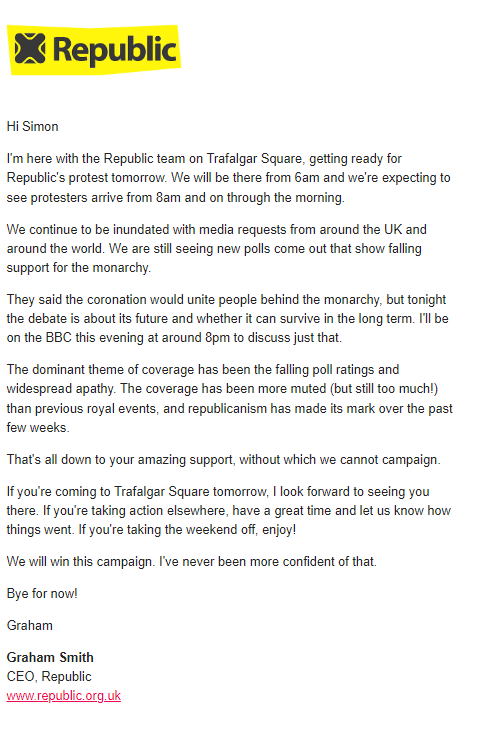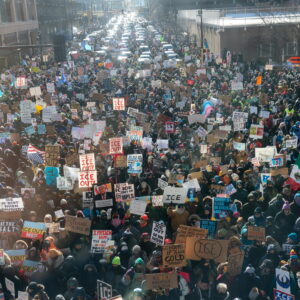The Rise of Authoritarianism in the UK
In March 2021, the city of Bristol witnessed multiple instances of police launching violent attacks on peaceful protestors who opposed the Police, Crime, Sentencing, and Courts Bill, which was then due to go through Parliament. This bill aimed to give the UK government and police more control over protests and was criticised by some on the left for potentially enabling a police state. According to Neil Faulkner’s writing at the time, the police’s attempts to suppress the pro-democracy movement in Bristol were part of a broader trend towards authoritarianism across the globe.
In line with Faulkner’s predictions, the police violence in Bristol was followed by further attacks on peaceful protestors at the Sarah Everard vigil in Clapham Common, London (also in March 2021). At the time, Faulkner criticised those on the Left who minimised the danger (The efforts of the Labour Party and the trade union movement were rather limited in scope and impact) and called for the formation of a pro-democracy movement to unite campaigns and struggles against Tory-police repression. Sadly, this did not happen, even though there were valiant efforts by Sisters Uncut (to name just one group), who recognised the serious danger and attempted to mobilise the left against this draconian bill. Unfortunately, and to our disadvantage, these campaigns failed to gain the necessary momentum to exert significant pressure on the government and effectively convey the concerns and demands to the public.
The Crackdown on Protests
Drawing from the events of March 2021, the arrests of anti-monarchy protesters on Saturday can be seen as yet another instance of state coercion to quell dissent and protect the interests of the ruling class. The pattern of aggressive policing, starting with the violent attacks against protestors in Bristol and continuing with the Sarah Everard vigil in Clapham Common, XR, Just Stop Oil, Animal Rising, and then the arrests at the coronation, is a disturbing indication of the state’s readiness (with continued changes to the law) to suppress democratic rights. As Faulkner’s analysis showed, a unified pro-democracy movement is now essential for resisting the growing trend of authoritarianism and Tory-police repression.
Drawing on a critical theoretical lens, the arrests of protesters, particularly those affiliated with the Republic campaign group headed by Graham Smith, offer a quintessential example of the state’s employment of repressive power to quell oppositional voices and preserve the existing power structures. Through this vantage, the state’s coercive measures against oppositional groups can be interpreted as a mechanism to uphold and perpetuate the hegemony of dominant capitalist ideology, constraining the capacity of the working class to challenge the status quo.
Figures such as London Mayor Sadiq Khan and Amnesty International UK’s chief executive, Sacha Deshmukh, have voiced concerns over the erosion of the fundamental democratic right to protest, a right that will always pose a challenge to the hegemony of the capitalist system. The struggle for democracy and the freedom to protest must continue to resist this ongoing encroachment on our civil liberties.
The Suppression of Dissent
Of even greater concern are the reasons provided by the Metropolitan Police for the arrests. Specifically, the police cited “intelligence” (presumably sourced from outlets such as the Daily Mail!) as the justification for the detainment of Night Stars, the women’s safety campaign affiliated with Westminster city council.
The arrests of a group dedicated to women’s safety are particularly alarming considering the Metropolitan Police’s history of misogyny, sexism, and even having rapists among its ranks. Fortunately, Mic Wright (See the tweet below and his Substack here) was committed to uncovering the story, while his colleagues in the mainstream press became absorbed in the coronation’s flag-waving and jingoistic patriotism.
Graham Smith, a member of Republic, alongside other members of the group, was arrested on what can only be described as questionable grounds. The Metropolitan Police’s Tactical Support Group, a unit with a notorious reputation, were responsible for the detainment. The supposed reason for the arrest was the possession of equipment that would enable them to “lock on,” specifically ‘luggage straps’ used to secure the load in a van. However, the fact that the straps were being used for this legitimate purpose appeared to be of little consequence to the police force in London.

Yesterday (Sunday 7 April), we witnessed an abundance of ‘copoganda’ (see below), showcasing the police in the manner they prefer to be seen. However, this image concealed their true role as foot soldiers for Conservative Home Secretary Suella Braverman, enforcers of Tory ideology, suppressors of protest, and guardians of capital.
Of course, the police, as an instrument of the bourgeois state, have defended their actions by claiming proportionality and the necessity to maintain order during the coronation, a symbolic event that reinforces existing power structures in society. However, human rights groups and campaigners argue that this approach undermines the freedom to protest and exposes the state’s intention to control dissenting voices. Despite close communication between the Republic and the Metropolitan police, the latter arrested 64 people, including the members of Westminster city council’s women’s safety campaign Night Stars (who had absolutely nothing to do with the coronation protest), further highlighting the state’s intervention to silence opposition. Hastily pushing ill-conceived laws through parliament and leaving their interpretation to the police is a formula for catastrophe.
The State’s Suppression of Dissent: Arrests and the Silencing of Opposition
All bourgeois states employ a mix of propaganda and police, consent and coercion, fraud and force. This delicate balance helps maintain power and control, but when it tips too far in one direction, it can open the door to the rise of fascism—a system characterised by an increasingly authoritarian regime, suppression of dissent, and the promotion of extreme nationalist ideologies. It is certainly fitting to label the arrests of protestors (be that Just Stop Oil or those of Republic) as having a whiff of fascism. The state’s use of coercive power to silence dissenting voices and preserve the interests of the ruling class reflects a repressive apparatus antithetical to the principles of democracy and civil liberties. In this context, it is essential to recognise the alarming authoritarian trends that are emerging in the UK, which are part of a broader global trend towards the erosion of democratic values and the intensification of class conflict.
Beneath (see the tweet) lies the rationale offered by the Metropolitan Police for Saturday’s arrests, eloquently positing that the Coronation, as a once-in-a-generation event, served as a pivotal consideration in effecting the arrests. In the face of uncertainty, one cannot find within the pages of law any explicit declaration that once-in-a-generation events hold supreme weight when enforcing the law’s mighty hand. Could it be that the Home Secretary’s authoritative decree has called for this distinct interpretation of the law’s implementation? The elucidation of these queries shall rest solely on the shoulders of Sir Mark Rowley when he is beckoned once more to the esteemed chamber of the Home Affairs Select Committee, tasked with defending the conduct of his unbridled constabulary.
The Rise of Fascism: Authoritarian Trends and the Erosion of Democratic Values
Fascism, as seen in the past, often ‘creeps’ into society as it takes over the existing state and transforms it into an instrument of dictatorship and repression. This process can involve violent shocks, as exemplified by Mussolini’s ‘march on Rome’ in 1922, Hitler’s appointment as German chancellor in 1933, and Franco’s coup in 1936. During the interwar period, a strong working-class movement created by the global revolutionary upsurge of 1917-1923 had to be physically dismantled before a pro-corporate dictatorship could be established. Mass fascist paramilitaries, such as the Blackshirts in Italy, the Brownshirts in Germany, and the Blueshirts (Falangist paramilitary militia) in Spain, played a significant role in this process.
In contrast, the contemporary era lacks such a powerful working-class movement due to forty years of defeat and retreat under neoliberalism. This has weakened the power of organised labour to the point where fascist paramilitaries are relatively unimportant. Although these groups are present and can grow, as seen in the United States with actions against Black Lives Matter and the storming of Congress, they are not the main threat. Instead, the primary danger comes from the existing state apparatus, which has the potential to impose authoritarian measures and curtail democratic freedoms.
Fascism consistently exhibits two main characteristics. Firstly, it seeks to establish a widespread movement centred on the regressive ideas of nationalism, racial superiority, and traditional family values, directing societal anger towards marginalised, oppressed, and unfamiliar groups. Secondly, it involves forceful suppression by the police against any opposition, protests, or progressive struggles (another example here), ultimately leading to the elimination of any organised resistance against the dominance of capital and the government.
Another useful definition of fascism for us to consider is from a recent book by B.S Rabinowtiz, stating:
fascism is an extreme form of ethnic nationalism that merges myths of an exalted national past with militarism and totalitarianism and involves the popular mobilisation of the masses.
Now what do you see here?
The Signs of Danger: A Call to Action Against Fascism
The signs of fascism are all around us. The police arresting peaceful protestors, the hatred spewed towards migrants arriving by small boats, the attacks on the trans community, the rise of Christian fundamentalism, the assault on reproductive rights, and the attacks on the concept of “woke” are all part of a concerted effort to stamp out opposition and control society. The fact that these actions are being carried out by those in power, or those who aspire to it, is evidence that fascism is not some abstract historical concept but is already here, creeping into the fabric of our society. If we do not act soon, the consequences could be dire, and the freedoms we take for granted could be lost forever. We must unite and fight against this dangerous trend, and we must do it now before it’s too late.
Still not convinced?
Consider the indignation aimed at “Bridgerton” star Adjoa Andoh, who voiced the thoughts of many by questioning the extent to which a predominantly white, hereditary monarchy truly reflects the diverse tapestry of 21st-century multicultural Britain.
This, naturally, sent the internet’s foremost champion of free speech, Laurence Fox, into a disoriented frenzy. It appears that Lozza’s advocacy for unrestrained expression only extends to opinions that align with his constricted perspective.
Resist the Rise of Fascism
The Public Order Act 2023 (The Public Order Bill builds on the public order measures in Part 3 of the Police, Crime, Sentencing and Courts Act 2022) was always going to be an attack on our right to protest, our right to freedom of expression, and our right to democracy. We just didn’t heed the warning. We have drifted into a police state without even realising it.
We have already seen the police use violence to crack down on peaceful protests. We have seen them arrest and charge people for simply exercising their right to speak out. We cannot allow this to continue.
We must build a mass movement to defeat the Conservatives and their police. We must reach out to our friends, family, neighbours, and colleagues and tell them what is at stake. We must organise protests and demonstrations in every town and city across the country. We must make it clear to the government that we will not tolerate this attack on our rights.
We must resist the creeping authoritarianism of the Conservative government.
We are not yet living in a fascist state. But if we do not act now, we could be.
We must turn the arrests at the coronation into a mass movement of hundreds of thousands. We must stand up for our rights and defend our democracy.
Art (55) Book Review (127) Books (114) Campism (32) Capitalism (68) China (81) Climate Emergency (99) Conservative Government (90) Conservative Party (45) COVID-19 (46) Creeping Fascism (38) Economics (42) EcoSocialism (60) Elections (85) Europe (46) Far-Right (35) Fascism (64) Film (48) Film Review (69) Fourth International (32) France (72) Gaza (63) History (42) Imperialism (101) Iran (32) Israel (130) Italy (46) Keir Starmer (57) Labour Party (116) Long Read (42) Marxism (49) Marxist Theory (47) Migrants (36) Palestine (186) pandemic (78) Protest (154) Review (35) Russia (345) Solidarity (153) Statement (50) Trade Unionism (144) Ukraine (351) United States of America (140) War (371) Women (32)
Latest articles
- Your Party’s New Leadership – The CEC Election And The Likely FalloutWhat are the possible consequences of Your Party’s recent CEC elections, Joseph Healy looks at this in the current political context.
- Earthquake in Gorton, tremors in Downing st.Dave Kellaway makes an initial analysis of the Green victory in Gorton and Denton
- Your Party and the return of strategyThe CEC elections are over. Your Party needs a clear vision and action to coordinate the resistance to capitalism, climate collapse, and the far right, argues Simon Hannah.
- SEND reforms: Built to Fail?How far can the proposed SEND reforms overcome the conditions the system operates in, asks Simon Pearson
- Socialist Strategy: Minneapolis shows the wayThe victory of the people of Minneapolis against ICE and Trump is something we can be inspired by and learn from, writes Simon Hannah






